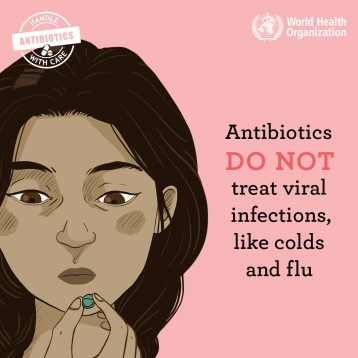
Why overusing antibiotics is harmful, and how to stay well and avoid the need for them
Talk to your health care provider about when antibiotics are helpful and when they are harmful – by doing so, you can help keep yourself, your family and your community healthy and well!
A Message from Dr. Sean Wachtel, FNHA Senior Medical Officer, Health Services
Antibiotics Awareness Week is November 12-18, and I'd like to take this opportunity to talk about a major public health concern shared by health care providers: the overuse of antibiotics. I'll also talk about how the Elders were right when they told us that using traditional medicines is, in certain cases, the best choice for what ails us – and share health care providers' top tips for reducing both illness and the need for antibiotics.
Always ask your health care provider
Antibiotics treat bacterial infections and can be useful when you're feeling sick and out of sync with your environment, but they can be harmful to your health when overused or used to treat conditions they cannot heal. Antibiotics do not work in treating viral infections like the common cold, so it's important to talk to your pharmacist, physician or other health care provider to determine whether antibiotics will actually help you. Pharmacists, as experts on medicines, are particularly well placed to advise you regarding your prescribed medications. Please don't hesitate to ask them questions; it is part of their job to provide such information!
In many cases, illnesses are viral and will get better on their own. And since antibiotics kill both good and bad bugs, overuse can cause more health problems, including an imbalance of beneficial and harmful bacteria in your gut, leading to diarrhea. Overuse can also increase the risk of certain chronic diseases, and of course as with all drugs, antibiotics have unpleasant or harmful side effects.
 Health care providers know that overusing antibiotics is a very serious public health problem as it contributes to antibiotic resistance, which means they no longer work when you really need them. This is a serious problem not just in Canada but around the world: according to the World Health Organization, in 2016 about 490,000 people developed multi-drug-resistant TB globally, meaning the disease is very difficult to treat with existing antibiotics, and drug resistance is now starting to complicate the fight against HIV and malaria. Further, without effective antibiotics, the success of major surgery (including caesarean sections), cancer chemotherapy, organ transplantation and diabetes management would be greatly compromised.
Health care providers know that overusing antibiotics is a very serious public health problem as it contributes to antibiotic resistance, which means they no longer work when you really need them. This is a serious problem not just in Canada but around the world: according to the World Health Organization, in 2016 about 490,000 people developed multi-drug-resistant TB globally, meaning the disease is very difficult to treat with existing antibiotics, and drug resistance is now starting to complicate the fight against HIV and malaria. Further, without effective antibiotics, the success of major surgery (including caesarean sections), cancer chemotherapy, organ transplantation and diabetes management would be greatly compromised.
Traditional Medicines and methods can help us keep well
Traditional medicines and methods can help keep us well during the winter cold season. Local plant-based medicines have been used since time immemorial to keep Indigenous people healthy and treat symptoms of colds and other illnesses. Cold-water bathing, vigorous walking, brushing, smudging, teas and poultices are just some examples of effective practices and medicines used year-round. Winter ceremony and letting-go practices also nurture our spirits and leave us less susceptible to viruses and colds.
Traditional Medicines and methods, when used in combination with the important practices below, can help you maintain your health and wellness:
Keep your hands clean by washing with soap and hot water and using alcohol- based hand gel on clean hands if soap and water are not available, especially before eating, using the bathroom or preparing food.
• Avoid spreading germs by keeping hands away from nose, mouth and eyes and staying home if you are sick.
• Practise safe sex.
• Ensure all your vaccinations are up to date.
• Keep your home clean, especially the kitchen and bathroom.
• Follow boil-water advisories and have well water regularly tested.
• Use antibiotics as prescribed and do not share them.
For more information about antibiotics, check out these links:
www.antibioticwise.ca
http://www.dobugsneeddrugs.org/

